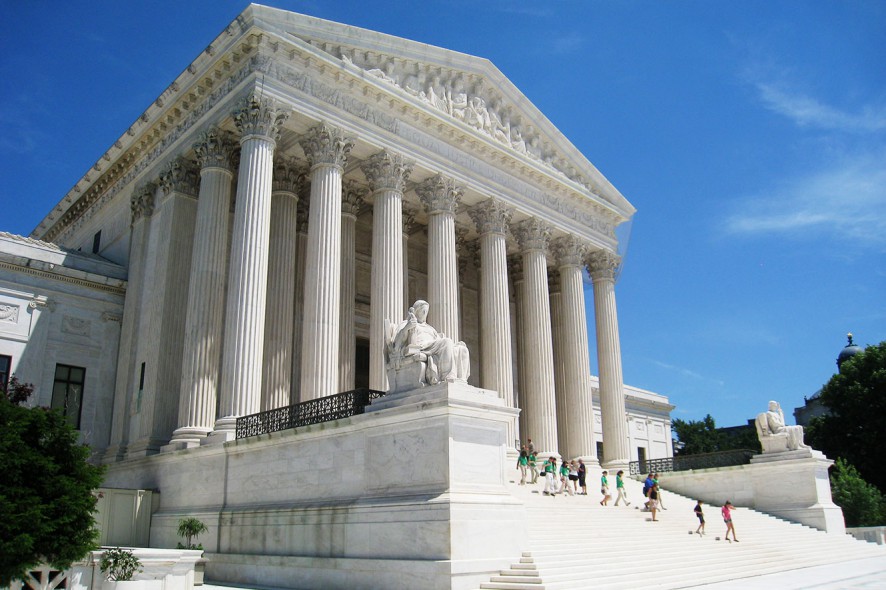Supreme Court of The United States: While looking into the question that whether the city of Philadelphia violated the First Amendment by discontinuing to refer deprived children to the Catholic Social Services (hereinafter CSS) on account of its refusal to certify same-sex couples to be foster parents due to its religious beliefs about marriage; the Court held that, the refusal of Philadelphia to contract with CSS for the provision of foster care services unless they agree to certify same-sex couples as foster parents, violates the Free Exercise Clause of the First Amendment. The decision of the Court was unanimous and was delivered by John Roberts, C.J., in which he was joined by Stephen Breyer, Sonia Sotomayor, Elena Kagan, Amy Coney Barrett, Brett Kavanaugh, Samuel Alito, Neil Gorsuch and Clarence Thomas, JJ.
Background: CSS is a Philadelphia based foster care agency involved in taking care of Philadelphia’s disadvantaged children ever since its establishment in the early 20th century. The Philadelphia foster care system depends on cooperation between the City and private foster agencies like CSS. When children cannot remain in their homes, the City’s Department of Human Services assumes custody of them. The Department enters standard annual contracts with private foster agencies to place some of those children with foster families. The placement process begins with review of prospective foster families. Pennsylvania law gives the authority to certify foster families to state-licensed foster agencies like CSS. Before certifying a family, an agency must conduct a home study during which it considers statutory criteria including the family’s “ability to provide care, nurturing and supervision to children. When the Department seeks to place a child with a foster family, it sends the contracted agencies a request. The agencies report whether any of their certified families are available, and the Department places the child with what it regards as the most suitable family. The agency continues to support the family throughout the placement.
Facts: The religious views of CSS are one of the core aspects of its work in this system. For over 50 years, CSS successfully contracted with the City to provide foster care services while holding to these beliefs. CSS believes that “marriage is a sacred bond between a man and a woman”. Since the agency understands the certification of prospective foster families to be an endorsement of their relationships, it does not certify unmarried couples (regardless of their sexual orientation) or same-sex married couples. The Court pointed out that CSS does not object to certifying gay or lesbian individuals as single foster parents or to placing gay and lesbian children. No same-sex couple has ever sought certification from CSS. If one did, then they directed the couple to other agencies in the City, all of which currently certify same-sex couples.
However in 2018, after receiving a complaint about a different agency, a newspaper ran a story in which a spokesman for the Archdiocese of Philadelphia stated that CSS would not be able to consider prospective foster parents in same-sex marriages. The Philadelphia Commission on Human Relations launched an inquiry. The Department informed CSS that it would no longer refer children to the agency. The City explained that the refusal of CSS to certify same-sex couples violated a non-discrimination provision in its contract with the City as well as the non-discrimination requirements of the citywide Fair Practices Ordinance. The City stated that it would not enter a full foster care contract with CSS in the future unless the agency agreed to certify same-sex couples.
CSS alleged that the referral freeze violated the Free Exercise and Free Speech Clauses of the First Amendment.
Observations: It was observed that the Free Exercise Clause of the First Amendment, applicable to the States under the Fourteenth Amendment, provides that “Congress shall make no law- prohibiting the free exercise” of religion and a plain reading of the provision reveals that Philadelphia’s actions have burdened CSS’s religious exercise by putting it to the choice of curtailing its mission or approving relationships inconsistent with its beliefs.
The Court noted that Section 3.21 of Philadelphia’s standard foster care contract is not generally applicable as the contract requires an agency to provide services defined in the contract to prospective foster parents without regard to their sexual orientation; but it also permits exceptions to this requirement at the “sole discretion” of the Commissioner. The Judges further observed that Philadelphia’s Fair Practices Ordinance, which forbids interfering with the public accommodations opportunities of an individual based on sexual orientation, does not apply to CSS’s actions. The Ordinance defines a public accommodation to include a provider “whose goods, services, facilities, privileges, advantages or accommodations are extended, offered, sold, or otherwise made available to the public.”. “Certification is not “made available to the public” in the usual sense of the words. Certification as a foster parent is not readily accessible to the public; the process involves a customized and selective assessment which cannot be compared to stating in a hotel or riding a bus”.
Finally, the Court observed that a government policy can survive strict scrutiny only if it advances compelling interests and is narrowly tailored to achieve those interests. Philadelphia does not have a compelling interest in refusing to contract with CSS. CSS seeks only an accommodation that will allow it to continue serving the children of Philadelphia in a manner consistent with its religious beliefs; it does not seek to impose those beliefs on anyone else. The refusal of Philadelphia to contract with CSS for the provision of foster care services unless the agency agrees to certify same-sex couples as foster parents cannot survive strict scrutiny and violates the Free Exercise Clause of the First Amendment. [Fulton v. City of Philadelphia, 2021 SCC OnLine US SC 37, decided on 17-06-2021]
Sucheta Sarkar, Editorial Assistant has reported this brief.






